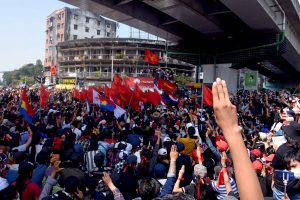This afternoon, the foreign ministers of the Association of Southeast Asian Nations (ASEAN) were scheduled to hold a virtual informal meeting to discuss the unfolding crisis in Myanmar. The online meeting, which will be hosted by current ASEAN chair Brunei, is the product of active diplomacy by Indonesia in the month since the February 1 coup that has plunged the country into political turmoil.
In a television interview late on Monday, Singapore’s Foreign Minister Vivian Balakrishnan said that ASEAN’s former ministers would be frank when they meet by video call and will tell a representative of Myanmar’s military they are appalled by the violence. Balakrishnan also said that the 10-member Southeast Asian bloc would encourage dialogue between Suu Kyi and the junta. “There is the political leadership … and there is the military leadership, on the other hand. They need to talk, and we need to help bring them together,” he said.
Balakrishnan’s comments came a day after he told parliament that ASEAN would urge both sides “to pursue a long-term peaceful political solution to achieve national reconciliation, including a return to the path of democratic transition.”
ASEAN’s action reflects a growing awareness within the bloc that the coup in Myanmar has put its legitimacy as a regional organization on the line. As I have observed before, ASEAN has long asserted a claim to centrality in Asian diplomacy but has often been seen as disappointingly sluggish in its response to regional crises. Adding to the burden of expectation is the fact that both the United States and China, wary of taking any action that creates strategic advantages for the other, have their own reasons to allow ASEAN to take the lead on resolving the country’s volatile crisis.
But ASEAN faces many challenges in addressing the situation in Myanmar. To start with, the bloc has to square intervention with its norm of non-interference and its consensus-based approach to decision making. While the non-interference principle has been bent and stretched in the past (the bloc forced Myanmar to forego its rotating chairmanship for 2006, for instance), ASEAN’s illiberal and undemocratic member-states (which is to say, most of them) will be wary about setting any precedent that the organization takes a close interest in their “internal affairs.”
This structural factor is reinforced by the sound practical reasons, including humanitarian ones, for ASEAN to maintain links of communication with whichever government rules in Naypyidaw. Unlike the Western governments that have openly pledged their support to the anti-coup protesters and demanded a reversal of the coup, Southeast Asian governments are temperamentally more realistic about Myanmar’s political situation in general, and the prospects for a reversal of the coup in particular. This helps explain why the bloc has eschewed blanket demands in favor of encouraging dialogue aimed at forestalling a further deterioration in the political situation and more bloodshed.
Yet on top of this challenge is layered another: the faint and vanishingly narrow line between engaging with the junta and legitimizing its seizure of power. This was demonstrated last week when it was reported that Jakarta was formulating an ASEAN action plan centered around holding the junta to its promise to conduct new elections in a year’s time.
The report prompted an immediate gathering of angry protesters in front of the Indonesian Embassy in Yangon, part of a broader outcry which forced Foreign Minister Retno Marsudi to cancel a planned trip to Naypyidaw. As one youth group told Reuters today, “ASEAN must understand that the coup or the re-election promised by the military junta is utterly unacceptable to the people of Myanmar.”
The outcome of ASEAN’s diplomatic efforts could also bear on its coveted position of “centrality” in Asian diplomacy. As Aaron Connelly of the International Institute for Strategic Studies in Singapore noted in an article yesterday, ASEAN’s claim to centrality has rested on great powers’ acceptance of its “position at the heart of the regional institutional architecture,” which has allowed ASEAN to chair major diplomat summits, “shaping the debates at these meetings in ways congenial to the bloc’s interests along the way.”
But now, with the identity of Myanmar’s legitimate government in dispute – and likely to be so for some time – ASEAN’s even indirect recognition of the junta runs the risk of alienating Western governments dismayed by the country’s sudden lurch back into military dictatorship. As Connelly points out, it is hard to imagine American or European foreign ministers and heads of government sitting down with coup leader Min Aung Hlaing at ASEAN summits and other diplomatic meetings.
As a result, “at the very least, American and European engagement with ASEAN is likely to be limited or downgraded, and could remain so until the result of the coup is reversed,” he wrote. “The coup is thus the most serious threat to ASEAN centrality that the organization has faced since its membership and role expanded following the Cold War.” Connelly predicted that ASEAN’s approach to this challenge “will have considerable consequences for regional diplomacy for years to come.”
ASEAN thus finds itself in the unenviable position of being expected to demonstrate its diplomatic mettle in a crisis that may be unsolvable – at least on the terms desired by the main domestic and international constituencies. What began as an outraged reaction of the Myanmar public to the military coup has coalesced into a broader struggle to defang the Tatmadaw and revoke its own self-claimed position of “centrality” in Myanmar’s politics. It is now unclear that the public would be satisfied by a return to the semi-democratic status quo ante, even if the military was willing to offer it.
“What can we expect?” the retired Singaporean diplomat Bilahari Kausikan wrote of today’s ASEAN’s informal meeting. “The short answer is: Not very much. The hard fact is that nobody, regionally or internationally, has much leverage over Myanmar, and that includes ASEAN.” Indeed, it is likely that ASEAN, like the wider world, will be end up being forced to react to events, rather than leading them.
































